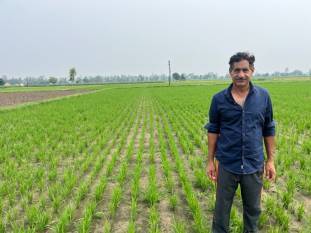MANILA / Philippines, 17 October 2023: On UN World Food Day, Bayer made a significant announcement at the 6th International Rice Congress in Manila. They introduced their Direct-Seeded Rice (DSR) system, aiming to transform rice cultivation by reducing water usage, greenhouse gas emissions, and labor dependency.
This revolutionary approach is part of Bayer's commitment to regenerative agriculture, offering farmers the potential to produce more while restoring the environment.
Advantages of DSR: Transitioning from traditional transplanted puddled rice to DSR brings several benefits. It can cut water usage by up to 40%, reduce greenhouse gas emissions by 45%, and decrease farmers' reliance on costly manual labor by up to 50%. The DSR system aligns with Bayer's regenerative agriculture initiative, creating a positive impact on both farmers and the environment.
India's Adoption and Expansion: DSR has the potential to be transformational, with expectations that 75% of rice fields in India will adopt this method by 2040, compared to just 11% today. Bayer plans to implement the DSR system on one million hectares in India by 2030, supporting over two million early-adopter smallholder rice farmers through its DirectAcres program.
Success of DirectAcres: DirectAcres has already seen significant success, with 99% of Indian farmers achieving successful plant establishment and 75% experiencing a higher return on investment compared to traditional transplanting. Bayer intends to introduce DirectAcres to other rice-growing countries in the Asia-Pacific region, starting with the Philippines in 2024.
A Comprehensive System: Bayer's approach combines seeds, crop protection, and digital solutions. They are developing climate-resilient rice hybrids designed for direct sowing, reducing the need for standing water and manual labor. This transformation will rely on new crop protection solutions, including a dedicated rice herbicide.
Digital Support for Farmers: Bayer's digital platform, FarmRise, supports smallholder farmers by offering advisory services, necessary machinery, and data-driven insights to help them make better agronomic decisions. This platform also connects farmers to Bayer's Carbon Program, allowing them to earn additional revenue by reducing emissions.
Environmental Impact Reduction: Rice is a vital crop, sustaining over half the global population. With the world's population expected to reach 10 billion by 2050, rice production needs to increase by 25%. However, it also contributes significantly to climate change, with 1.5% of global greenhouse gas emissions coming from rice production. DSR has the potential to reduce water usage and methane emissions, addressing the environmental impact of rice cultivation.
Collaborative Efforts for Transformation: Bayer acknowledges that transforming rice production requires a collaborative effort across the industry, food chain, and beyond. They are working closely with the International Rice Research Institute (IRRI) and participating in the Direct Seeded Rice Consortium (DSRC) to advance adoption and scalability.
A Sustainable Future: In conclusion, Bayer's Direct-Seeded Rice system offers a promising path towards a sustainable and eco-friendly future for rice cultivation. By reducing water usage, greenhouse gas emissions, and labor dependency, this innovative approach aims to secure food production for a growing global population while protecting the environment. Partnerships and collaboration are essential in this journey towards a regenerative and sustainable agriculture landscape.























